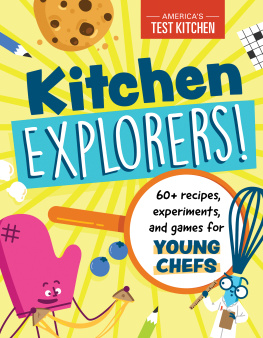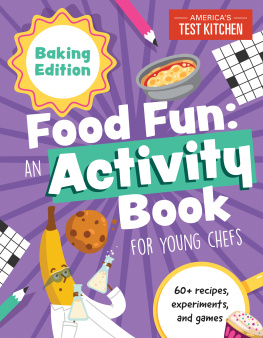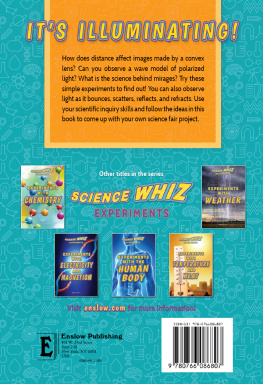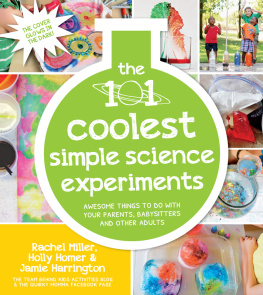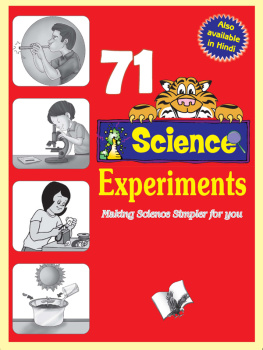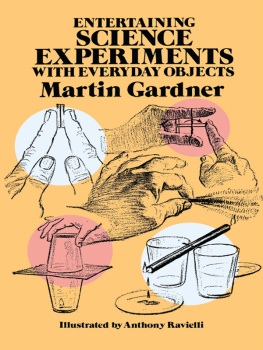IF you want to do something GOOD for a child,give him an ENVIRONMENTwhere he can TOUCH thingsas much as he wants.Buckminster Fuller
 ContentsThis book is a collection of science experiments that will excite any young learner. It has been developed at the urging of teachers who wanted easy reference to successful science activities. The result is a practical resource that can be effectively utilized with children ages three through twelve. All of these experiments have been tried a number of times.
ContentsThis book is a collection of science experiments that will excite any young learner. It has been developed at the urging of teachers who wanted easy reference to successful science activities. The result is a practical resource that can be effectively utilized with children ages three through twelve. All of these experiments have been tried a number of times.
They have been adult tested, kid tested, and will work successfully for you. If sometimes you do not arrive at the expected outcome, try again. This approach is part of being a scientist. The experiments are not our own creation. They have existed for many years and have been drawn from various sources. Primarily, they are ideas that have been shared by other early childhood teachers.
When we began our program, our goal was to excite the children in our preschool about the notion of science. Initially, having an educational background in Liberal Art as do many of our colleagues we felt unqualified to teach science to anyone. When we looked at the children, however, our feelings of inadequacies were soon dispelled. We understood that having a positive attitude about science was far more important than having extensive knowledge. Young children dont require detailed explanations of scientific principles. They need the same opportunity we offer in all other areas of learning: the chance to experience it first hand.
Simply put, they need to do science.With that in mind, we set out to develop a program in which the children could be active participants. Through our research and practical experimentation we discovered, much to our delight, that anyone can create an exciting and successful science component. Simple materials and basic ingredients of water, air, candles, vinegar, baking soda, salt, eggs, and balloons are readily available at low cost. As you look through our book, you will see that some of the activities are those that the adults demonstrate; but most are those in which the children take part. Through their involvement they learn basic concepts about gravity, air, fire, and water. But at this early level many of the activities simply appear to be like magic to them.
Mostly what we want our children to learn is that science is fun. The philosopher Le Rochefoucauld said, People rarely succeed at anything unless they have fun doing it. We wish you fun and success in developing or expanding your science program for young children.Diana, Sue and Donna1992Back in 1997 when I began doing my workshops I kept running into two women who were doing this fantastic science workshop that participants simply referred to as Fizzle Bubble. I checked it out they had experiments that fizzled, bubbled and popped and many activities that made you say WOW!I bought their book. I used their book. I inadvertently stained the book with vinegar, grape juice, food coloring and baking soda.
Many pages were dog-eared for ease of reference and others were simply falling out! The book was disintegrating from overuse I had to get another copy! And while Im at it, Ill get one for my mom, my director, my friend who needs some new ideas you get the picture!The experiments that they were teaching us in the workshop were EASY! They were SIMPLE! And they were done with supplies and materials I already had in the classroom and in my kitchen! I really was able to bolster up my science program. I realized I did not need to have a degree in science to be successful. Further readings and deeper explorations assisted me in realizing that EVERYTHING around us was science not just the activity we pulled out at 10:15 AM on Friday morning.After seeing them at workshops I started talking with the ladies the Fizzle Bubble Ladies as they were called! I learned their real names were Diana and Sue. We ran into each other more and more as I began doing more workshops. We became friends, making sure we met up with each other at a conference, even if it was just for a quick hello! before our individual sessions.I dont really remember when the topic came up, but there was a point when I shared with them about my early years growing up in Livermore, California and the amazing nursery school I was able to go to. It was then that Diana shared with me that not only did she grow up in the house across the street from Marys Nursery School but that her mother used to teach there!This connection to such an important part of my past was small yet very significant.
We started to make more of an effort to stay connected. We began sharing ideas with each other, chatting after workshop sessions and staying in touch between conferences.Diana became my long distance mom, always checking in with me, making sure I was staying healthy, not burning the candle at both ends, not traveling too much, picking me up from the airport when I was in her area, supporting me in my expanding efforts to take OOEY GOOEY, INC. nationwide.Then in 1999 while wrapping up an afternoon breakout session at a conference at California State University/Hayward, Diana came running into the workshop room asking, So how did you like your surprise?Surprise? I asked, What surprise?You didnt know?Know WHAT??!!She pointed to two ladies in the audience, Surprise!I looked in the direction she was indicating there were two ladies, sitting together, eyes bright, smiles beaming It was Miss Mary and Miss Nancy! My teachers from nursery school! I had not seen them since I was about ten. What an emotional reunion that was! Thank goodness my friend and colleague Shalimar Moniz was there to wrap up the workshop for me as I melted into tears of surprise and happiness!



